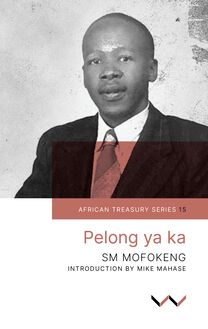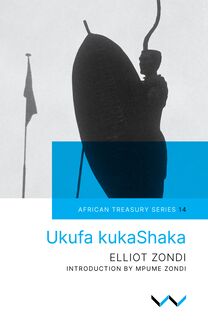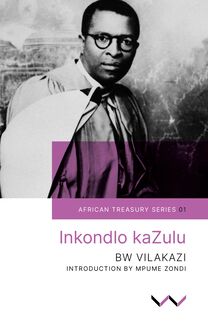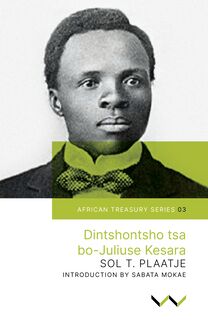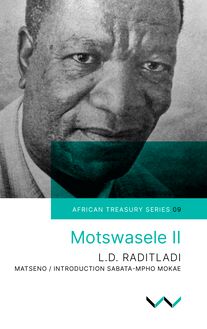Pelong ya Ka , livre ebook
58
pages
Sotho, Southern
Ebooks
2021
Vous pourrez modifier la taille du texte de cet ouvrage
Obtenez un accès à la bibliothèque pour le consulter en ligne En savoir plus
Découvre YouScribe en t'inscrivant gratuitement
Découvre YouScribe en t'inscrivant gratuitement
58
pages
Sotho, Southern
Ebooks
2021
Vous pourrez modifier la taille du texte de cet ouvrage
Obtenez un accès à la bibliothèque pour le consulter en ligne En savoir plus
Publié par
Date de parution
01 octobre 2021
Nombre de lectures
5
EAN13
9781776145348
Langue
Sotho, Southern
Pelong ya ka contains twenty essays and stories on personal themes, filled with observational detail and meditations on the author’s life and surroundings.
Pelong ya ka is a volume of twenty essays and stories, first published in 1962. In his short life Sophonia Machabe Mofokeng, an expert on African folklore, was also regarded as a gifted exponent of Southern Sesotho, and this assessment is still valid today.
The essays and stories in this collection are largely autobiographical, with the author being both the writer and the main character in them. Their style is in turn meditative, descriptive, narrative and polemic, and the tone of voice of the narrator is characterised by melancholy, humour and satire. The themes span a wide range of human experiences, and reflect Mofokeng’s deep personal convictions and passion for freedom, as well as his Christian beliefs . As he says in ‘Nako’ (‘Time’), ‘we are worried because we want to live for a long time, as if the most important thing is to live for many decades, but the fact is that we must live our life to the fullest’.
His descriptions of his time spent in hospital are filled with insights into the experiences of the people he met there, and reflect his gift for recounting the details of everyday life with both depth and simplicity.
Chapter 1 Pelo
Chapter 2 Botho
Chapter 3 Bodutu
Chapter 4 Lefu
Chapter 5 Reisisi
Chapter 6 Tsela-tshweu
Chapter 7 Phetoho
Chapter 8 Nako
Chapter 9 Metswalle
Chapter 10 Pampiri
Chapter 11 Hlahlobo
Chapter 12 Noka
Chapter 13 Ho kganna motorokara
Chapter 14 Lewatle
Chapter 15 Sepetlele
Chapter 16 Dimela
Chapter 17 Tjhelete
Chapter 18 Lenyalo
Chapter 19 Boqheku
Chapter 20 Qetello
Publié par
Date de parution
01 octobre 2021
Nombre de lectures
5
EAN13
9781776145348
Langue
Sotho, Southern
PELONG YA KA
The African Treasury Series, published from the 1940s onwards, consists of works written by pioneers of South African literature in African languages. It has provided a voice for the voiceless and celebrated African culture, history and heritage. The reissue of these foundational texts with new introductions supports ongoing efforts to highlight the importance of writing in indigenous languages, and to remember and celebrate these early giants of African literature.
These reissued texts maintain the orthographic and typesetting fidelity of the original editions published by Wits University Press. New introductions to the texts are included, in the original language and in English.
Several years of concerted effort went into restoring this collection to its rightful place in the canon of African literature. Wits University Press took care to be mindful of the major changes in publishing that have occurred since the works were first published, and undertook several initiatives to reissue these texts. A grant was received from the WiSER Mellon African Digital Humanities project in order to produce the new editions.
Several strong supporters of this project were instrumental in advising, working on and providing the solid basis on which the full print and digital availability of these titles could be completed. It is thanks to the tireless efforts of Nhlanhla Maake, Tuelo Gabonewe, Langa Khumalo, Mike Mahase, Njabulo Manyoni, Sabata Mokae, Fran Saunders, Dumisani Sibiya, Pat Tucker, Mpume Zondi and Karen Press.
Published in South Africa by
Wits University Press
1 Jan Smuts Avenue
Johannesburg 2001
www.witspress.co.za
First published by Wits University Press, 1962
Published edition © University of the Witwatersrand, 2021
Introduction © Mike Mahase, 2021
Cover photograph: SM Mofokeng Collection (DCAS 59), UNISA Library, Archives & Special Collections
978-1-77614-043-5 (Paperback)
978-1-77614-044-2 (Web PDF)
978-1-77614-534-8 (EPUB)
All rights reserved. No part of this publication may be reproduced, stored in a retrieval system, or transmitted in any form or by any means, electronic, mechanical, photocopying, recording or otherwise, without the written permission of the publisher, except in accordance with the provisions of the Copyright Act, Act 98 of 1978.
Every effort has been made to locate the original copyright holder of the cover image reproduced here by kind permission of UNISA Library, Archives & Special Collections; please contact Wits University Press in case of any omissions or errors.
Proofreader and translation of Introduction: Mike Mahase
Project manager: Fran Saunders and Karen Press
Cover design: Hybrid Creative
Typeset in 10.5 point Plantin
Lenaneo
Selelekela
Introduction
Pelo
Botho
Bodutu
Lefu
Reisisi
Tselatshweu
Phetoho
Nako
Metswalle
Pampiri
Tlhahlobo
Noka
Ho kganna motorokara
Lewatle
Sepetlele
Dimela
Tjhelete
Lenyalo
Boqheku
Qetello
Selelekela
Mike Mahase
Ngk. Sophonia Machabe Mofokeng (PhD) (1923–1957)
Bophelong ba hae bo kgutshwane o ngotswe dibuka tse tharo Senkatana (1952), Leetong (1954), le Pelong ya ka eo a e ngotseng pele a hlokahala e ile wa phatlalatswa selemong sa 1962. Hape o ile a ngola mmoho le Profesa C.M. Doke buka e bitswang A Textbook of Southern Sotho Grammar (1967).
O ngotse Pelong ya ka ha a ntse a le sepetlele Rietfontein moo a qetileng dikgwedi tse leshome le metso e robedi. Le ha a ne a kula o ngotse buka ena ka boswasi le metlae eo a neng a tsejwa ka yona. Mmadi a ka ba le kgopolo ya hore Mofokeng one a ngola a se a ntse a bona hore o se a tla hlokahala hobane dipalekgutshwe tse leshome le metso e mmedi ho tse mashome a mabedi tse bukeng ena, mokotaba wa tsona o itshetlehile ho bophelo le lefu.
Buka ena hape e ka nkwa e le eo a e ngotseng ka bophelo ba hae. M.M.Dube (1996: vii) o ngola jwana: ‘re elellwa kgokahanyao dingoloweng tsa hae le bophelo ba hae ba nnete hobane re na le pelaelo hore mesebetsi ya hae e ne e le ka bophelo ba hae. Batho ba re phethetseng tsa bophelo ba hae ba nnete ke ba lelapa la hae, metswalle le basebetsimmoho le yena’. Palekgutshweng ya Noka Mofokeng o ngola tjena: ‘Ha eso ke moeding wa Lesotho le Foreisetata. Ha ke qala ho hlaha mahlo ke ne ke se ntse ke tseba hore Lesotho ke mose ho Mohokare mono.’ Efela e le nnete hobane Mashaeng (Fouriesburg) e moeding wa Freistata le Lesotho.
Ntle le ho amanya noka le moedi o neng o arohanya diprovense le dinaha (jwalo ka ngwana o ne a ena le tumelo e tiileng ya hore meeding ya diprovense le dinaha kamehla ke dinoka – ha a hola, o ile a makatswa ke ho bona hore seo ha se kamoo a neng a hopola kateng), Mofokeng o bapisa noka le batho. Ho Noka o etsa papiso e hlollang ya noka le nako bophelong ba botho:
Ha o eme lebopong la noka, o sheba ka metsing, o ipona habedi, ngwaneso. Ha o ipone seriti feela o ipona botho ba hao le ba batho ba bang. Hoba noka e tshwana le rona haholo feela. Mona moo o emeng teng o bona metsi a phalla a feta. Ha o tsebe hore na a tswa kae, a fetile kae, a entseng tseleng; ha o tsebe hore na a phallela kae, na a tla etsang tseleng; a tla thusa mang, a felle kae. Le bona bophelo bo phalla jwalo. Ke re, jwalo ka motho eo o mmonang mateanong a ditsela -eo o sa tsebeng hore na o ya kae, o tswa kae, o etsang, o tla fella kae.
Mabapi le ho tshwenyeha ha batho ke nako, palekgutshweng e bitswang Nako o ngola hore:
Re a kgathatseha hobane re batla ho phela nako e telele, jwalo ka ha eka tabataba ke ho phela mengwahangwaha, athe taba ke ho phela bophelo ba rona ka botlalo. Ho ya phelang bophelo ba hae ka botlalo, letsatsi e ntse eka dilemo, mme dilemo eka letsatsi.
Hona palekgutshweng eo o theha papiso ya nako le bophelo, le bohlokwa ba nako, mme o tswela pele o re:
Ha o ntshitse watjhe ya hao mokotleng, o e behile hodima tafole e ntse e qaqata teng; kapa ha o e shebile o ntse o e tlamme letsohong la hao, nakana le ntse le potoloha, na o ke o nahane seo e se etsang? Na o ke o elellwe hore naka le lenyenyane le ntse le bolela hore hora ya hao ya ho theohela mobung o batang e ntse e atamela? O ke o bone hore hora e nngwe le e nngwe e fetang e ke ke ya hlola e kgutla?
Pokeletso ena ya dipalekgutshwe e bontsha tabatabelo e tebileng ya hae ya tokoloho. Maikutlo a hae ha a ne a ngola dipalekgutshwe tsena a ka bapiswa le sethothokisi John Milton (1608–1674) ha a ne a ngola thothokisi e bitswang ‘On his blindness’ . Phapano feela ke hore Mofokeng yena one a ngola a sa sarelwa hobane, jwalo kaha ho qotsitswe ho nalane ya bophelo ba mofu e ngotsweng ke Profesa Doke o mo hlalosa tjena: ‘o ne a dula a thabile le ha a ne a le matshwenyehong’ (Doke n.d). Hona tokomaneng eo ya bophelo ba mofu, Profesa Doke o ngola jwana: ‘Ha ke na lebala letsatsi leo a neng a tla ka phaposing ya ka ho mpolella hore dingaka di fumane hore o tshwerwe ke Bohloko ba Lefuba (TB), mme o ne a ilo amohelwa Sepetleleng sa Rietfontein’.
Palekgutsweng e buka ena e reheletsweng ka yona, Pelong ya ka , Mofokeng o ngola ka ho utlwisa bohlokwa ba pelo. Nakong ya ho ngolwa ha buka ena ho ne ho so be le dioporeishene tsa ho kenya batho dipelo tsa ba bang. O ngola tjena ka pelo:
Pelo ke setho se seng seholo hakalo mmeleng wa motho empa se hlokahalang haholo hoo motho a sitwang ho phela ha se le siyo. Re tseba ka ho otla ha yona hore motho o sa phela. Ha e se e otla hanyenyane le teng re a tseba hore bophelo ha bo sa le matla, lebone le se le rata ho tima. Teng ha e se e eme, re tseba hore e se e le maobane.
Dipalekgutsweng tse pedi Noka le Nako o bapisa noka le nako:
Empa le yona[noka], jwalo ka ntho tsohle tsa lefatshe lena, e a phalla, e a feta, ha e a ema. Ya batlang ho e sebedisa o tshwanetse a etse jwalo hona jwale, ho seng jwalo yona e a iphetela, jwalo ka nako. Hoba nako le noka di a tshwana. Nako le yona ke noka feela, ke ntho e le nngwe maobane le hosasa ke ntho e le nngwe, ha di bile ha di a arohana hakalo....
Ka noka o ngola o re:
Ha o eme lebopong la noka, o sheba ka metsing, o ipona habedi, ngwaneso. Hao ipone seriti feela o ipona botho ba hao le ba batho ba bang. Hoba noka e tshwana le rona haholo feela. Mona moo o emeng teng o bona metsi a phalla a feta. Ha o tsebe hore na a tswa kae, a fetile kae, a entseng tseleng; ha o tsebe hore na a phallela kae, na a tla etsang tseleng; a tla thusa mang, a felle kae. Le bona bophelo bo phalla jwalo. Ke re, jwalo ka motho eo o mmonang mateanong a ditsela -eo o sa tsebeng hore na o ya kae, o tswa kae, o etsang, o tla fella kae.
Mofokeng one a lemoha dintho tse mopotapotileng mme a di bona ka mokgwa o fapaneng le batho ba bang. O ile a qeta nako e telele sepetlele mme ho dipalekgutshwe tsena Bodutu le Sepetlele o ngola ka bodutu le ho kula. Ho Bodutu o re:
Motho o a kula. Ha a batle ho robala fatshe, ha a batle ho sala hae ha batho ba ile mosebetsing motshehare. Basotho ba re ha motho a se a robetse fatshe o ye a ikutlwe a kula haholo le ho feta pele. Nnete e teng hona moo jwalo ka nthong tse ngata tsa Basotho. Motho ya robetseng fatshe hangata o sala a le mong. O bolawa ke bodutu. Boinotshing ba hae o na le nako ya ho mamela le ho utlwa mahlaba a ka beng a sa fihle le pelong ya hae ha a ne a e na le batho ba bang. O ikutlwa a lahlehile, a furaletswe. O elellwa hore ha a a dumellwa ho ya mosebetsing le ba bang, ho tsamaya moo ba tsa mayang. Hobane o a kula.
Ho ka akanngwa hore o ngotse palekgutshwe ena nakwana kamora ho amohelwa sepetlele – ke ya boraro letotong la dipalekgutshwe tse bukeng ena. Hape ho ka akanngwa hore o ne a ngola ka bodutu ba hae.
Dipalekgutshweng tse tharo tse bukeng ena, Lefu, Qetello le Boqheku di ngotswe di arohane empa qetellong di bua ka dintho tse tshwanang. Ho Qetello o re:
Hamore e a lla jwale. Pekere tsa ho qetella di a kokotelwa. O kwallwa ka mona jwale, a le mong, a sa sisinyehe, a sa phefumolohe. Kganya ya letsatsi ha a sa tla e bona, moya o phodileng, dipula, mahlwa, phoka; sa hae ke lefifi la kamehla kamehla ho fihlela….e, ho fihlela neng? Ho tseba mang? Ho l
